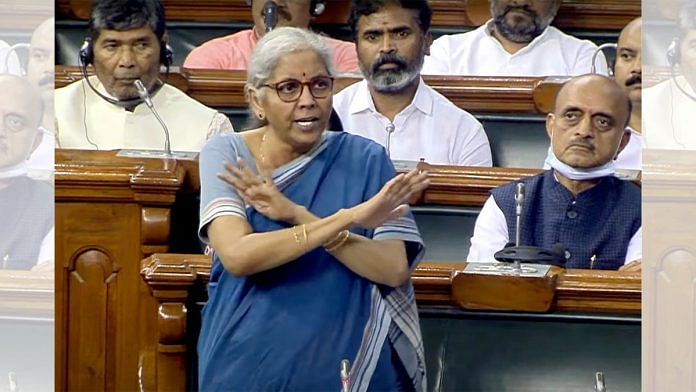New Delhi: The Narendra Modi government has assured states that there will be no shortage of funds to spend on capital expenditure as they will be receiving timely transfer of their share in central taxes and their revenue deficit grants, ThePrint has learnt.
The assurance has come amid the states crying foul about the Centre slashing their funds that could be used for capital creation, after having determined their net borrowing capacity while taking liabilities of state entities into account.
According to calculations shared by finance ministry officials with ThePrint, the Centre expects states’ own tax revenues in the current year to exceed that of the past two years. This despite more money being given to states to bridge the shortfall in their Goods and Services Tax (GST) compensation in 2020-21 and 2021-22, when Covid had ravaged their finances.
In 2021-22, the Centre transferred a total of Rs 2.59 lakh crore to the states as GST compensation — Rs 1 lakh crore of which was from the GST compensation cess collections, and the remaining Rs 1.59 lakh crore as back-to-back loans to states to make up for the shortfall in GST compensation cess.
“So, if you add the states’ own tax revenues, plus the loan and compensation cess, in 2022-23, states are likely to exceed that amount [of the past two years],” a top government official told ThePrint on condition of anonymity.
Plus, with the increase in GST collections in the current year, the official added, states will have enough funds to spend on capital expenditure.
Replying to the debate on price rise in the ongoing Parliament session, Union Finance Minister Nirmala Sitharaman said Monday that the GST compensation to states till May 2022 has been paid by the Centre. She added that the compensation for June is pending, which will be cleared as soon as compensation demands from all states have been received.
At Rs 1.49 lakh crore, the GST mop-up for July 2022 was the second highest since the introduction of the indirect tax regime. The official quoted above said that last year, the average monthly GST collections were roughly Rs 1 lakh crore. However, so far in 2022-23, the collections have averaged around Rs 1.4 lakh crore. In April, they had touched a record Rs 1.68 lakh crore.
“Continuing the positive trend, this month’s GST collections are 28 per cent higher compared to the collections in the same month last year,” said Abhishek Jain, Partner, Indirect Tax, KPMG India.
“These consistent high collections indicate recovery from the pandemic and can also be attributed to inflation and tight check and balances implemented by the government. Further, with rationalisations being implemented, subsequent to the recent GST Council meet, these numbers may further go up in the coming months,” he added.
Also read: Caught in a debt trap, Indian states will have to borrow more money to repay loans
Fuss over states’ off-budget loans
In March, the finance ministry, while fixing the Net Borrowing Ceiling (NBC) of the states for FY 2022-23, had said that borrowings by state public sector companies/corporations or their special purpose vehicles (SPVs) and other equivalent instruments — where principal and interest are to be serviced out of the state budgets — shall be considered as borrowings made by the state itself.
This has resulted in a reduction of about Rs 40,000 crore from the NBC of states in 2022-23, a senior government official told ThePrint, adding that Telangana, Andhra Pradesh and Kerala are the worst-affected by this decision.
For 2022-23, the Centre has fixed a borrowing cap of Rs 8.57 lakh crore, or 3.5 per cent of states’ Gross Domestic Product (GDP).
Under Article 293(3) of the Constitution, states can’t borrow beyond their annual limits set by the Centre. However, the finance ministry has highlighted that many states have circumvented this rule, giving guarantees and mortgaging public assets.
In a presentation made to the chief secretaries of states in June, Union Finance Secretary T.V. Somanathan highlighted that five states — Andhra Pradesh, Uttar Pradesh, Punjab, Madhya Pradesh and Himachal Pradesh — raised up to Rs 47,316 crore in the two years ending March 2022 by “escrowing of future revenue”.
Escrowing means using state assets in the safe custody of a financial institution to secure loans against them.
The Centre’s data, according to the presentation, showed that Telangana has outstanding guarantees of Rs 1.35 lakh crore (around 11 per cent of the state’s projected GDP in 2022-23), followed by Sikkim, Andhra Pradesh, Uttar Pradesh and Rajasthan. “Some states have large outstanding guarantees which pose a threat, if invoked,” it was noted at the meeting in June.
Kerala Finance Minister K.N. Balagopal had written to Sitharaman last month, expressing concern over the reduction in revenue deficit grants, ending GST compensation from July, and factoring in borrowings by state entities and public account liability while fixing borrowing limits of states.
He blamed the finance ministry for putting the state in a financial crisis by slashing its resources by Rs 23,000 crore in the current financial year.
According to data with the Comptroller and Auditor General of India, the aggregate capital spending of 23 states declined by 10.3 per cent in the first two months of the current fiscal compared to last year, while also remaining lower than what was seen in the pre-Covid period.
(Edited by Zinnia Ray Chaudhuri)
Also read: ‘Why politicise?’ Oppn MPs object as govt flags states’ ‘poor fiscal health’ at Lanka meeting



